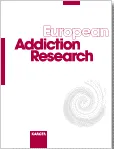| Titre : | Posttraumatic stress disorder is a risk factor for multiple addictions in police officers hospitalized for alcohol (2019) |
| Auteurs : | P. BRUNAULT ; K. LEBIGRE ; F. IDBRIK ; D. MAUGÉ ; P. ADAM ; H. EL AYOUBI ; C. HINGRAY ; S. BARRAULT ; M. GRALL-BRONNEC ; N. BALLON ; W. EL-HAGE |
| Type de document : | Article : Périodique |
| Dans : | European Addiction Research (Vol.25, n°4, June 2019) |
| Article en page(s) : | 198-206 |
| Langues: | Anglais |
| Discipline : | PSY (Psychopathologie / Psychopathology) |
| Mots-clés : |
Thésaurus géographique FRANCEThésaurus mots-clés ETUDE CLINIQUE ; ETAT DE STRESS POST-TRAUMATIQUE ; FACTEUR DE RISQUE ; MILIEU PROFESSIONNEL ; POLICE ; ALCOOL ; AUDIT ; ADDICTION ; TABAC ; CANNABIS ; JEU PATHOLOGIQUE |
| Résumé : |
BACKGROUND: In police officers, posttraumatic stress disorder (PTSD) is associated with alcohol use disorder (AUD), but we lack data on the association between PTSD and other substance-related and addictive disorders.
OBJECTIVES: We assessed whether PTSD could be a risk factor for different substance-related and addictive disorders in police officers, including alcohol, tobacco, cannabis, and gambling. METHOD: This cross-sectional study included all police officers admitted consecutively for alcohol to an inpatient ward dedicated to police officers (Le Courbat rehabilitation center, France; n= 133). Each patient completed self-administered questionnaires that assessed lifetime exposure to potentially traumatic events (Life Event Checklist for DSM-5), PTSD severity and diagnosis (PTSD Checklist for DSM-5), AUD severity (Alcohol Use Disorder Identification Test [AUDIT]), tobacco dependence (Fagerstrom test for Nicotine Dependence), cannabis dependence (Cannabis Abuse Screening test), and gambling disorder (Canadian Problem Gambling Index). RESULTS: Mean AUDIT score was 23.7 +/- 8.0; 66.2% had an AUDIT score >=20. Our sample comprised a high prevalence for PTSD (38.3%) and for substance-related and addictive disorders: tobacco dependence (68.4%), cannabis dependence (3.8%), and pathological gambling (3%). Patients with PTSD experienced higher lifetime exposure to traumatic experiences: physical assault, severe human suffering, sudden accidental death of another person, and other types of stressful events/experiences. In multiple linear regressions adjusted for age, sex, and marital status, PTSD was a significant predictor of the severity of AUD and tobacco use disorder, but not of the severity of cannabis use disorder nor gambling disorder. CONCLUSIONS: PTSD is common in police officers hospitalized for alcohol and associated with a higher severity of some addictive disorders (alcohol/tobacco). PTSD and its comorbid addictive disorders should be systematically screened and treated in this population. |
| Domaine : | Addictions sans produit / Addictions without drug ; Alcool / Alcohol ; Drogues illicites / Illicit drugs ; Tabac / Tobacco / e-cigarette |
| Refs biblio. : | 54 |
| Affiliation : | CHRU de Tours, Equipe de Liaison et de Soins en Addictologie, Tours, France |
| Cote : | Abonnement |
| Lien : | https://doi.org/10.1159/000499936 |
 Accueil
Accueil



